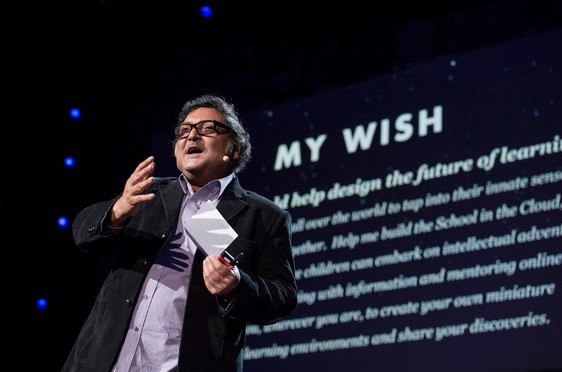
Reference: http://www.huffingtonpost.com/vanessa-lafaye/education-technology_b_2775252.html
Education in developed countries is convulsing at all levels in the drive to find more open, productive, and cost-effective models. Meanwhile in rural India, Sugata Mitra is demonstrating so elegantly that learning is a powerful, innate drive, not necessarily dependent on classrooms or even teachers. I buy into the idea that what we don't need is another generation of students trained to pass exams. Although there are many unanswered questions about the SOLE project (Who vets the volunteers? Where do the skilled workers come from? What counts as success?), there is a chance that, with TED's backing, it could have real impact on the shape of learning in the future, turning it from 'push' to 'pull'.
It is interesting to note that Mitra's TEDTalk is titled, "The Future of Learning" rather than "Education." This distinction seems like the heart of the issue, not only for SOLE (self-organized learning environment), but more widely. It's the difference between absorbing information, and developing faculties for creative thought and analytical problem-solving.
He traces today's education system back to the Victorian-era hunger for literate bureaucrats, needed to keep the wheels of the British Empire running smoothly. As it happens, my employer Wiley was established even before this time. Also as it happens, publishing is undergoing a dramatic reinvention today, in search of new models in response to the urgent imperative to prepare our young for the creative economy of tomorrow. This got me thinking about evolution, of knowledge and ourselves.
Evolution of knowledge: Mitra's vision rests on a foundation of constantly updated, free information on the Internet about, well, everything. As a publisher, while I'm thrilled by the thought of a long-term need for high-quality, trustworthy content, I'm particularly interested to know who will curate that and how. The raging debate over the freedom of academic content is directly relevant to Mitra achieving his goals. It seems like a loop that needs closing for the SOLE project.
If we turn the Internet into the world's memory, what becomes of our own? Will we be able to solve immensely complex problems, but not find our way home afterwards?
- Vanessa Lafaye
Evolution of us: Whatever you think of this TED Prize wish, Mitra's work raises fascinating questions about not only the future of learning, but about the evolution of the human brain. Before the advent of writing, all accumulated knowledge had to be remembered. Through the centuries, we've devised tools that make us less reliant on memory, to the point where today many people would be completely lost without the information saved in their cell phones. Mitra questions the value of 'knowing' in an era where any information we need is available online in an instant. I found this utterly intriguing, the idea that our brains could change from being sheds, where we store stuff (and keep mounding it up, higher and higher, until we can't see what's at the bottom), to being engines, which make stuff happen. What if, instead of spending our most fertile cognitive years mastering sets of facts (I took extra math in high school because I hated phys-ed, but it's been decades since I showed off my algebra skills), we used them to solve world problems, create, and innovate? Communicate? What could we achieve if we could devote all of our mental power to action, rather than accumulation?
But here's an interesting thing about the 'Just-in-Time' brain: Memory is a highly conserved function, which we all know behaves like a muscle in a use-it-or-lose-it kind of way. If we turn the Internet into the world's memory, what becomes of our own? Will we be able to solve immensely complex problems, but not find our way home afterwards?
Both education and publishing are heading for evolutionary tipping points which have been 200 years in the making. Our equilibrium is about to be spectacularly punctuated. The SOLE project could be seen as disruptive for both, and there were some anxious mutterings along with a lot of optimism in the TED conference hall when it was announced. But there is another view: that new opportunities are there, for anyone willing to engage creatively with new paradigms.
Copyrights © 2013-2024 MyECO. Powered by Citech. All Rights Reserved.